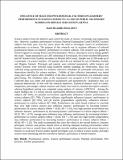Influence of Selected Psychosocial Factors on Learners’ Performance in Science Subjects: A Case of Public Secondary Schools in Moyale Sub-County, Kenya

View/
Date
2017Author
Kirui, Joash Mwandike
Type
ThesisLanguage
enMetadata
Show full item recordAbstract
Science subjects form the bedrock upon which the study of science, technology and engineering lies. However, academic performance in Kenya National Examination Council (KNEC) science subjects has been poor over the years; hence the need to investigate causes of unimpressive performance in sciences. The purpose of this research was to examine influence of selected psychosocial factors on learners’ performance in science subjects. This research was guided by Social Cognitive Learning Theory and Psychoanalytic Theory. Descriptive survey design guided this study. Target population was 1292 consisting of 9 principals, 64 science teachers588 parents and 631 learners from 9 public secondary in Moyale Sub-County. Sample size of 296 made up of 3 principals, 14 science teachers, 135 parents and 144 was obtained by use of Bertlett, Kotrilik and Higgins formula. Principals and parents were selected purposively while learners and science teachers were selected using stratified random sampling for observation. Data was collected using questionnaire for learners, interview schedules for principals and parents, and observation checklist for science teachers. Validity of data collection instruments was tested using peers and experts while reliability of the data collection instruments was estimated using pilot-testing. The reliability index of the instruments was accepted at 0.70 Cronbach’s alpha. Collected data was coded and analyzed qualitatively and quantitatively. Qualitative data was analyzed thematically in line with the research objectives. Statistical analysis such as counts, frequencies, percentages, tabular matrices and charts were used to examine descriptive statistics whereas hypothesis testing was computed using analysis of variance (ANOVA). Among the major findings are: (1) science anxiety significantly influences learners’ performance in science subjects (Ƞ2=.850); (2) parental involvement significantly influences learners’ performance in science subjects (Ƞ2=.798); (3) peers influence significantly influences learners’ performance in science subjects (Ƞ2=.916); and (4) teacher preparedness significantly influences learners’ performance in science subjects (Ƞ2=.900). Furthermore, the study found evidence to conclude that: very high science anxiety may influence learners’ performance by lowering learners’ performance in science subjects (Mean = 16.83, SD = 5.10); very high parental involvement may influence learners’ performance by increasing learners’ performance in science subjects (Mean = 56.32, SD = 4.73); average peers influence may influence performance by increasing learners’ performance in science subjects (Mean = 46.84, SD = 1.70); and very high teacher preparedness may influence performance by increasing learners’ performance in science subjects (Mean = 46.84, SD = 2.62). The study recommends that since the school is the second home to a learner; principals, teachers and parents should strive to develop adequate learning environment where learners are free to consult them when in need, provide reading materials and arouse interest in learners to work hard. Future studies should investigate ways to reduce science anxiety and make science more interesting and less stressful to learners, particularly to female learners.
Publisher
Africa Nazarene University
Subject
Psychosocial factorsScience performance anxiety
Parental involvement
Peer pressure
Teacher preparedness
Collections
- Education [59]
